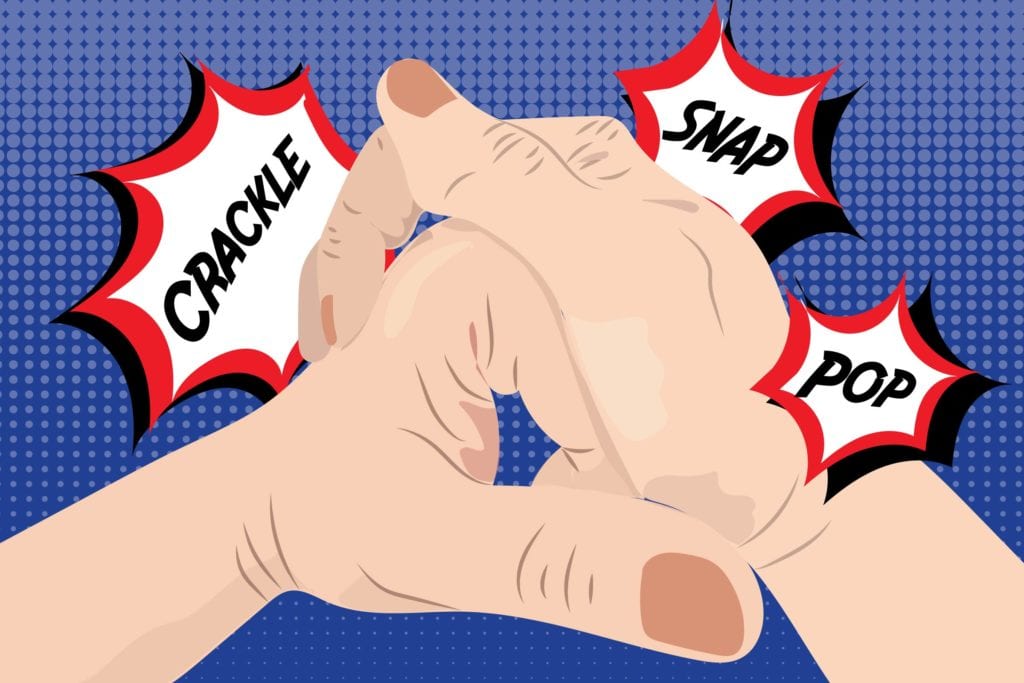

Do you wince when people crack their knuckles? Or — gasp — are *you* the knuckle cracker in the room everyone stares at?
If you are a knuckle cracker, has anyone (say, your mom) ever tried to get you to stop by warning you that your annoying hand habit will lead to osteoarthritis (OA)?
Well — sorry, mom — there’s no evidence to back up the claim that joint cracking can lead to arthritis.
Here, we address the finer points of cracking joints:
What Causes the Sound When You Crack Your Knuckles?
Your joints are surrounded by a capsule, or sac. The capsule contains a liquid called synovial fluid, which acts as a lubricant and prevents friction so the joints can move around smoothly. Synovial fluid contains gas bubbles.
When you crack your knuckles, you stretch the space between your finger joints, which causes the bubbles to burst and create that distinctive popping sound.
The reason you can’t crack the same knuckle or joint twice in a row is because it takes some time for the gas bubbles to accumulate again in the joint. (If you want an in-depth explanation of the physiology of knuckle cracking, check out this journal article in Scientific Reports.)
So, Can Cracking Your Knuckles Cause Arthritis?
No — and there’s ample scientific research to back up why not. A 2011 study published in the Journal of the American Board of Family Medicine looked at 215 people between ages 50 and 89 who had had an X-ray of their right hand during the previous five years. The researchers found a similar incidence of knuckle OA in any one joint among people who said they cracked their knuckles and those who didn’t, irrespective of how frequently or for how many years the person cracked.
Another study, published in a 1998 issue of the journal Arthritis and Rheumatology, was done by a single doctor who experimented on his own hands. (Talk about dedicating your life to science.) Over his lifetime, he cracked the knuckles of one hand, but not the other. After decades of this behavior, he took X-rays and found that both hands had the exact same incidence of arthritis.
Are There Any Risks of Joint Cracking?
There has been some research indicating that longtime knuckle crackers may experience hand swelling and a reduced hand grip over time, but there is still no evidence that cracking your knuckles causes arthritis.
However, if there’s pain that accompanies your knuckle cracking, it could mean that there are other problems with the structure of the joint, according to WebMD, such as loose cartilage or injured ligaments. And some people with arthritis, bursitis, or tendinitis might notice cracking sounds because of the snapping of their swollen tissues.
If you feel pain when your knuckles crack, you should see a doctor to figure out why.
What Does Cause Hand Arthritis?
Osteoarthritis occurs when cartilage — a tough slippery substance that coats the ends of the joints — breaks down. Over time, as the cartilage continues to wear away, the bones rub together, which makes movement difficult and painful. Causes of arthritis include wear-and-tear that occurs with age, repetitive hand motions (like typing), prior injuries, and possibly a genetic predisposition. There is not much you can do to prevent arthritis in the hands.
So, if you want to crack your knuckles, crack away — and tell your mom that she has to come up with a better reason than arthritis to get you to stop.





